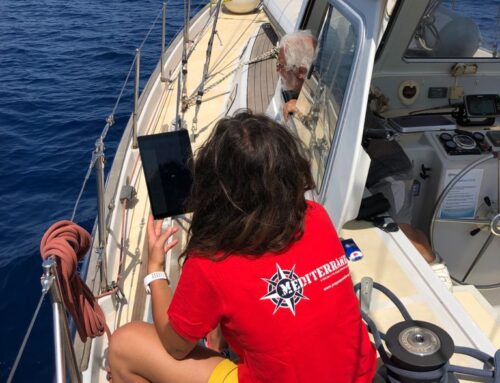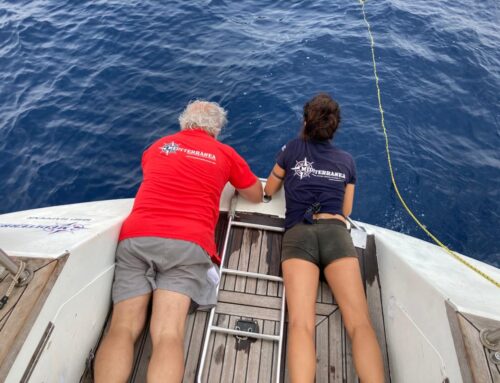(by Simone Perotti)
“What is the Mediterranean…”. Christos Hadziiosif, is a meditative, well-groomed, person who dresses with sober elegance. His courtesy and gentleness give him the air of a gentleman from another era. He is indeed a sensitive and cultured man, a scholar, who knows exactly what to say in a very straightforward manner, without too many compromises. My first question is a huge one, very general, but also intentionally concise.
Hadziiosif takes his time to ponder it: “It is a area which is geographically, physically, politically and culturally divided”. A good start for someone who is the Director of the Department of Modern and Contemporary History at Crete University as well as the Director of the Mediterranean Study Centre. “An anthropologist and a historian may see it as a unifying and unified area, but the Mediterranean is above all about division. Which works, however, on the continuous question of unification. Industrialized countries have worked hard to exploit Southern Europe and North Africa, as well as the Middle East, so that there is nothing surprising about this division”.
And the religions, I add. “Religion is a very bad filter to attempt to understand the problems of the world …”.
What must be done to unite the Mediterranean? “Politics must take concrete action to improve the condition of people, and their daily lives. People must be reassured, not simply thrown into a panic. Social inequality is too pronounced. Consider Greece for example. If things continues as they are, if things are not managed with intelligence, there is the risk of a civil war”.
A real risk? “A part of society, in terms of generations and left-wing politicians, remember the horrors of the civil war and work to ensure that it does not repeat itself. Young people and another part of the country do not remember these horrors, and are manipulated, and at the mercy of racist, xenophobic, nationalistic and violent schools of thought. Of fascism, or rather of fascisms”.
I think aloud of the army and police … “Certainly. The new fascisms spread in the army and, above all, in the police force. You can see it in the exaggerated reactions and violence perpetrated during the clashes in the squares and how law and order is applied during demonstrations. But you can also see it in how the police treats, the immigrants on one hand and violent people on the other, with double standards”.
Golden Dawn has however been decapitated. “Yes, even if we will still need to see what happens during the proceedings. No one has any doubts that they were fascists and violent, we all know that, but during the trial, and legal proceedings, who knows what will happen … Will the leaders of Golden Dawn remain in prison?” You seem to be worried Hadziiosif.
How important are economic interests in this game of the Mediterranean? “There are different, and often diverging, interests. Northern and Southern Europe have different interests, both in terms of dimensions and direction. For Germany, the Mediterranean is a secondary economic area, for Greece and Italy it is a vital area”.
In Italy Mediterranean is not seen in this way. Are you sure that everyone sees the Mediterranean as a vital area? “You’re right. All our energies have been spent to enter the EU, becoming part of the Euro, and now at attempting to remain in Europe, above all economically. Little or nothing has been done about the Mediterranean. In Greece, at least, people have lost sight of the value and opportunities offered by the Mediterranean”.
Perhaps it wasn’t always been like this. “Towards the 80’s, Germany and Greece had a complementary relationship. They were a reciprocal market. Today what Greece sold and offered to Germany, from products to tourism, they sell and offer to other countries, at lower prices, which globalisation has placed in competition with Greece. Today Germany no longer needs Greece at all …”
Do you think that a feeling of common Mediterranean citizenship exists? “To a very limited extent. The countries of Southern Europe consider themselves different from each other. They say to themselves ‘we won’t end up like the Greeks, we are different’. The relationship is therefore not about identity, but a lack of homogeneity, divisions and diversities. The countries in the Mediterranean area do not know each other. In Italy people know more about Germany than they do about Greece”.
But isn’t it clear to everyone, as it is to me, that the Mediterranean is the great opportunity, the possible solution to break the deadlock and decadence, which is not only economic, of this age? “I don’t think so. I feel that very few people believe this. At least in Greece”.
And what are the intellectuals doing? Their role of guidance, where is it? Is anyone thinking of indicating the path of the Mediterranean, so that others may follow, become involved and work towards this goal, above all, politics? “Look, I don’t remember who wrote this, perhaps it was Ortega Y Gasset: intellectuals are the praetorians of politics. There is a caste of intellectuals, everywhere, but certainly in Greece, who act as the praetorians of power. Perhaps only in the university world is there a breath of something different. There I have seen a great deal of interest in the East, the South, the Islamic world, in Africa, to better understand and experience the Mediterranean. A number of professors are active, but it is above all the students who encourage this sensitivity”.
While Hadziiosif speaks of the need to take action, to work, to concretely identify what people need, as a strategy of unification of the Mediterranean, I decide to waste no further time. When all is said and done, the interview is almost over. I tell him that what we need is new hope, and that this new hope may be the Mediterranean, union, dialogue, meeting each other halfway, but on a different basis, which is not only economic but above cultural, and that the need for this New Mediterranean Frontier is strong, and it should be the intellectuals who generate it, attracting people and giving them new hope. Hadziiosif listens to me very carefully. I glimpse a flash in his eyes. And the nods. “I feel that it is a beautiful idea … to end your interview”. He smiles. We shake hands and say that we look forward to seeing each other in Crete.






Leave A Comment